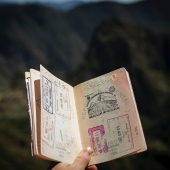Thousands of people travel each year looking for improving a second language. Those who have little time for learning a language or who have never studied in another country should take certain precautions to ensure the success accomplishment of their goal. Here are 6 tips we want to share with you:
1. Absorb the culture: One of the most common mistakes of people who go to study abroad is to go out with people from the same country or with the same language, as it makes it easier to communicate. It does not mean that you should avoid and stop seeing them, but if you invested in going to Paris, London or another city to practice your native language, it is not a very smart decision. Seize the opportunity to practice with natives and other foreigners, increasing the chances of improvement. Since you have decided to take this opportunity, use it to live the other culture completely, when you go back home you will have plenty of time to enjoy your customs, culture and language.
2. Be tolerant: Tolerate differences by respecting and trying to understand others. The country you choose to study in can be very different from the reality that the student is accustomed to. The challenge is to fit-in this new reality and take advantage of the new experience. Not all travellers understand that respect for the other culture is part of the experience of studying abroad. It doesn’t mean that an entire culture suits everyone, but if you are the outsider you should try to adapt to the host culture. Before traveling, try to investigate their customs, traditions, time management (punctuality), social behaviour or event etiquette; all this in order to avoid misunderstandings and disappointments.
3. Read the manual: Sometimes there is too much information for students in brochures, catalogues and guides, but it is of vital importance to read the institution brochure in order to get a big picture of your stay. Read carefully, as you will be provided with information necessary to ensure a good experience and it will give you tips that will save you headaches. Documentation required, lodging options, extra benefits and optional services among others are often included in these manuals. Feel free to ask questions and choose wisely.
4. Do not isolate yourself: Just as it is very convenient to share your time with people of the same country, sometimes and due to the cultural shock you may feel isolated, alone and vulnerable. It is normal to have difficulties at the beginning, but avoiding sharing with others only is going to make you more difficult to learn. Get out of your comfort zone and push yourself to try harder.
5. Prioritize: Some people complain about the limited time available to travel and see the surroundings. It is very important that you have a clear purpose when travelling and keep your priorities in mind all the time. If you want to mix your studies with some pleasure, it is better not to take a crash-course to be rushing all the time and instead we suggest you to take things easy and have also the opportunity to enjoy some free time to explore, without stopping the attendance to classes.
6. Packing luggage: It is usually one of the greatest challenges before traveling. You must take into account the weather and the duration of your studies. Try to bring only the essentials, with time you will learn how to dress without spending money in a whole new wardrobe. The first impulse is to pack all your clothes to be prepared for any situation but then, you will be paying extra for exceeding your luggage allowance with the airline. There are several pages and even videos that give you more tips on how to and what to pack. You can get even packing check lists.










